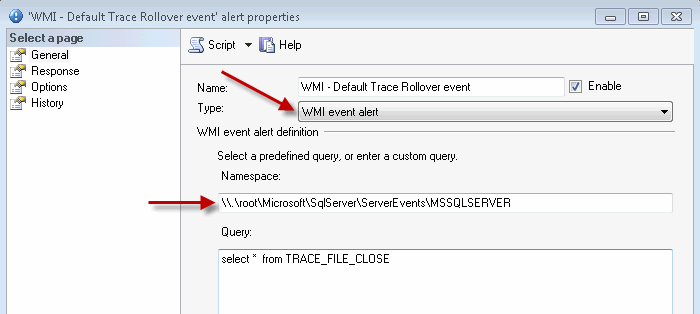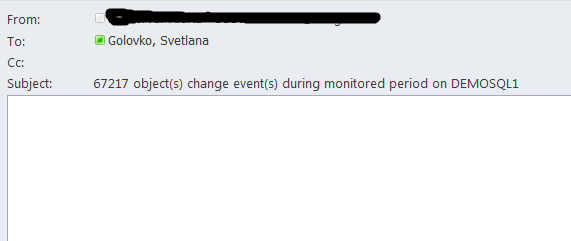By: Svetlana Golovko | Comments (3) | Related: > Profiler and Trace
Problem
SQL Server has a Default Trace that runs automatically to collect various metrics that are used to help you monitor SQL Server. By default SQL Server only keeps the last 5 trace files that are created and deletes older files. Every time a trace file reaches 20MB or when the SQL Server instance is restarted, the oldest trace file is deleted. On a very busy server this could occur quite frequently, so any older events would be lost before you ever saw what was captured. Fortunately there is a WMI event that can help to capture this data for long term storage and analysis.
Solution
In a previous tip, we explained how to setup WMI alerts for database change monitoring. The setup consists of SQL Server Agent configuration steps, Database Mail configuration, creation of an alert and a SQL Server Agent Job.
Similar setup will be used in this example, so we can import trace data every time a new file is created. To do this, we will use the TRACE_FILE_CLOSE WMI event and we will utilize the sys.fn_trace_gettable function together with a method similar to the one described in another tip. Every time a new trace file generated the previous trace file is closed and WMI event is triggered. We will import the closed trace file's events as soon as the new trace file is created.
In this example we will monitor only non-system databases events related to tables, views or stored procedures that are changed (new object, deleted object, modified object).
Create an Audit Table
First we will create the audit table where we will import the trace data into:
CREATE DATABASE [_Demo_DB1] ON PRIMARY ( NAME = N'_Demo_DB1', FILENAME = N'S:\TESTSQL_DATA\_Demo_DB1.mdf' ) GO USE [_Demo_DB1] GO CREATE TABLE dbo._demo_objects_changes( RowNumber int IDENTITY(0,1) NOT NULL, EventClass int NULL, ApplicationName nvarchar(128) NULL, LoginName nvarchar(128) NULL, StartTime datetime NULL, DatabaseName nvarchar(128) NULL, HostName nvarchar(128) NULL, ObjectName nvarchar(128) NULL, ObjectType nvarchar(20) NULL, TraceName nvarchar(128) NOT NULL, TextData nvarchar(MAX) NULL, PRIMARY KEY CLUSTERED (RowNumber ASC ) ON [PRIMARY] ) ON [PRIMARY] GO
You can add other columns to the table if you want to save additional information from the trace file or you can remove some of the columns from the table as needed. Just make sure you update the job below with the correct columns.
Create a SQL Server Agent Job
Now we will create a un-scheduled SQL Server Agent Job called "WMI Response - Default Trace File Rollover" that will be executed as a SQL Server Alert's response. The job will respond to the WMI alert every time a trace file is closed.
Here is the script for the job's step:
DECLARE @rows INT, @subj_str NVARCHAR(200)
-- check if trace that is closed is default trace
IF ('$(ESCAPE_SQUOTE(WMI(FileName)))' =
(SELECT REPLACE([path],
REPLACE(RIGHT([path],CHARINDEX('_',REVERSE([path]))-1),'.trc',''),
CAST(CAST(REPLACE(RIGHT([path],CHARINDEX('_',REVERSE([path]))-1),'.trc','')
AS SMALLINT)-1 AS NVARCHAR(128)) )
FROM master.sys.traces WHERE id = 1))
BEGIN
INSERT INTO dbo.[_demo_objects_changes]
(EventClass,
ApplicationName,
LoginName,
StartTime,
DatabaseName,
HostName,
ObjectName,
ObjectType,
TraceName,
TextData)
SELECT EventClass,
ApplicationName,
LoginName,
StartTime,
DatabaseName,
HostName,
ObjectName,
ObjectType,
'$(ESCAPE_SQUOTE(WMI(FileName)))',
CAST(TextData AS NVARCHAR(MAX))
FROM sys.fn_trace_gettable( '$(ESCAPE_SQUOTE(WMI(FileName)))',1 )
WHERE eventclass IN (164, -- Object:Altered
46, -- Object:Created
47 -- Object:Deleted
) AND DatabaseID > 4
AND ObjectType IN ( 8272, -- Stored Procedure
8277, -- (User-defined) Table
8278 -- View
)
SELECT @rows = @@ROWCOUNT
IF @rows > 0
BEGIN
SELECT @subj_str = cast(@rows as NVARCHAR(200)) +
' object(s) change event(s) during monitored period on ' + @@SERVERNAME
EXEC msdb.dbo.sp_send_dbmail
@profile_name = 'Mail_Profile_Name', -- update with your value
@recipients = '[email protected]', -- update with your value
@subject = @subj_str;
END
END
You will need to update @profile_name and @recipients parameters with your values (@profile_name will be the "Mail profile" that you created during Database Mail configuration):
The job will select object change events from the trace file that was just closed, insert them into the audit table and send a generic email about the number of changed objects. To minimize the number of emails the email will be sent only if there are object change events in the closed trace file.
Please refer to the Microsoft documentation to learn about other trace object types (in addition to tables, views or stored procedures).
To get the full list of trace event classes read this article.
Setting up the WMI Alert
To set up the alert use this script:
EXEC msdb.dbo.sp_add_alert @name=N'WMI - Default Trace Rollover event', @message_id=0, @severity=0, @enabled=1, @delay_between_responses=0, @include_event_description_in=1, @wmi_namespace=N'\\.\root\Microsoft\SqlServer\ServerEvents\MSSQLSERVER', @wmi_query=N'select * from TRACE_FILE_CLOSE', @job_name=N'WMI Response - Default Trace File Rollover' GO
You can also use SQL Server Management Studio for this:
- set the alert type to "WMI event alert"
- make sure you use the correct WMI namespace (see below):

Note: the namespace will be different for the default instance and for the named instance:
-- DEFAULT instance's namespace ("DEMOSQL1" SQL Server):
\\.\root\Microsoft\SqlServer\ServerEvents\MSSQLSERVER
-- NAMED instance's namespace ("DEMOSQL1\INSTANCE1" SQL Server):
\\.\root\Microsoft\SqlServer\ServerEvents\INSTANCE1
- Set the response for the alert's properties to execute the SQL Agent job we created above:

Testing the Alert
Now we are ready to test and receive email notifications every time a new trace file is created and the old trace file contains object modification events.
NOTE: Make sure that for the following testing you use a test SQL Server and a separate test database. There will be a lot of database changes and some SSMS reports (for example "Schema Changes History") may not work in the test database.
In this test we will artificially force the new trace file creation by running multiple create/alter/drop statements:
-- fill out the trace file by creating, altering and dropping objects with long names
USE [_Demo_DB1]
GO
SET NOCOUNT ON
DECLARE @n INT, @t NVARCHAR(100) , @str NVARCHAR(1000)
SELECT @t = N'aaaaaaaaaaaaaaaaaaaaaaaaaaaaaaaaaaaaaaaaaaaaaaaaaaaaaaaa',@n = 1
WHILE @n < 7000
BEGIN
SELECT @str = N'create table dbo.' + @t + cast(@n AS NVARCHAR(20)) +
N' (col1 varchar(10), col2 int);'
EXEC sys.sp_executesql @str
SELECT @str = N'create procedure dbo._demo_' + @t + cast(@n AS NVARCHAR(20)) +
N' AS SELECT 1;'
EXEC sys.sp_executesql @str
SELECT @str = N'alter table dbo.' + @t + cast(@n AS NVARCHAR(20)) + N' add col3 int;'
EXEC sys.sp_executesql @str
SELECT @str = N'drop table dbo.' + @t + cast(@n AS NVARCHAR(20))
EXEC sys.sp_executesql @str
SELECT @str = N'drop procedure dbo._demo_' + @t + cast(@n AS NVARCHAR(20))
EXEC sys.sp_executesql @str
SELECT @n = @n + 1
ENDIt may take several seconds before the new trace file is created and you may need to change the @n value to generate more changes if a new trace file is not created.
You should then get an email similar to this when a new trace file is created:

Review the Captured Trace Results
To see what information has been captured, you could run a query similar to the one below:
USE [_Demo_DB1]
GO
SELECT TOP 10 RowNumber
,CASE WHEN EventClass = 164 THEN 'Object:Altered'
WHEN EventClass = 46 THEN 'Object:Created'
WHEN EventClass = 47 THEN 'Object:Deleted' END AS EventClass
,ApplicationName
,LoginName
,StartTime
,DatabaseName
,HostName
,ObjectName
,CASE WHEN ObjectType = 8272 THEN 'Stored Procedure'
WHEN ObjectType = 8277 THEN '(User-defined) Table'
WHEN ObjectType = 8278 THEN 'View' END AS ObjectType
,TraceName
FROM dbo._demo_objects_changes

Next Steps
- Modify the provided scripts to monitor events that you need to audit, so you don't lose that information.
- Refer to this previous tip about setting up WMI alerts if you need to troubleshoot the WMI alert setup described in this tip.
- Read this tip about How to Automate SQL Server Monitoring with Email Alerts.
- Read this tip about How to setup SQL Server alerts and email operator notifications.
- Read another tip about monitoring SQL Server using WMI.
- Get familiar with "WMI Provider for Server Events Concepts".
- Use other classes for your SQL Server events monitoring.
- Get a list of columns that are available for a given WMI event XML schema.
About the author
 Svetlana Golovko is a DBA with 13 years of the IT experience (including SQL Server and Oracle) with main focus on performance.
Svetlana Golovko is a DBA with 13 years of the IT experience (including SQL Server and Oracle) with main focus on performance. This author pledges the content of this article is based on professional experience and not AI generated.
View all my tips






